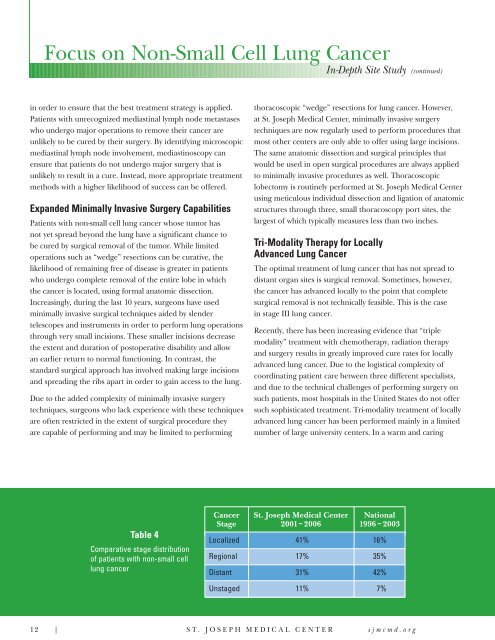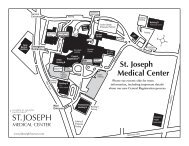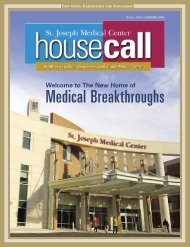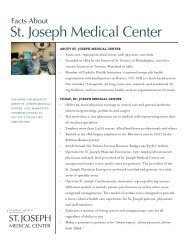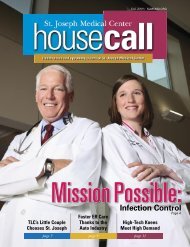2007 Cancer Annual_prod5 - St. Joseph Medical Center
2007 Cancer Annual_prod5 - St. Joseph Medical Center
2007 Cancer Annual_prod5 - St. Joseph Medical Center
You also want an ePaper? Increase the reach of your titles
YUMPU automatically turns print PDFs into web optimized ePapers that Google loves.
Focus on Non-Small Cell Lung <strong>Cancer</strong><br />
In-Depth Site <strong>St</strong>udy<br />
(continued)<br />
in order to ensure that the best treatment strategy is applied.<br />
Patients with unrecognized mediastinal lymph node metastases<br />
who undergo major operations to remove their cancer are<br />
unlikely to be cured by their surgery. By identifying microscopic<br />
mediastinal lymph node involvement, mediastinoscopy can<br />
ensure that patients do not undergo major surgery that is<br />
unlikely to result in a cure. Instead, more appropriate treatment<br />
methods with a higher likelihood of success can be offered.<br />
Expanded Minimally Invasive Surgery Capabilities<br />
Patients with non-small cell lung cancer whose tumor has<br />
not yet spread beyond the lung have a significant chance to<br />
be cured by surgical removal of the tumor. While limited<br />
operations such as “wedge” resections can be curative, the<br />
likelihood of remaining free of disease is greater in patients<br />
who undergo complete removal of the entire lobe in which<br />
the cancer is located, using formal anatomic dissection.<br />
Increasingly, during the last 10 years, surgeons have used<br />
minimally invasive surgical techniques aided by slender<br />
telescopes and instruments in order to perform lung operations<br />
through very small incisions. These smaller incisions decrease<br />
the extent and duration of postoperative disability and allow<br />
an earlier return to normal functioning. In contrast, the<br />
standard surgical approach has involved making large incisions<br />
and spreading the ribs apart in order to gain access to the lung.<br />
Due to the added complexity of minimally invasive surgery<br />
techniques, surgeons who lack experience with these techniques<br />
are often restricted in the extent of surgical procedure they<br />
are capable of performing and may be limited to performing<br />
thoracoscopic “wedge” resections for lung cancer. However,<br />
at <strong>St</strong>. <strong>Joseph</strong> <strong>Medical</strong> <strong>Center</strong>, minimally invasive surgery<br />
techniques are now regularly used to perform procedures that<br />
most other centers are only able to offer using large incisions.<br />
The same anatomic dissection and surgical principles that<br />
would be used in open surgical procedures are always applied<br />
to minimally invasive procedures as well. Thoracoscopic<br />
lobectomy is routinely performed at <strong>St</strong>. <strong>Joseph</strong> <strong>Medical</strong> <strong>Center</strong><br />
using meticulous individual dissection and ligation of anatomic<br />
structures through three, small thoracoscopy port sites, the<br />
largest of which typically measures less than two inches.<br />
Tri-Modality Therapy for Locally<br />
Advanced Lung <strong>Cancer</strong><br />
The optimal treatment of lung cancer that has not spread to<br />
distant organ sites is surgical removal. Sometimes, however,<br />
the cancer has advanced locally to the point that complete<br />
surgical removal is not technically feasible. This is the case<br />
in stage III lung cancer.<br />
Recently, there has been increasing evidence that “triple<br />
modality” treatment with chemotherapy, radiation therapy<br />
and surgery results in greatly improved cure rates for locally<br />
advanced lung cancer. Due to the logistical complexity of<br />
coordinating patient care between three different specialists,<br />
and due to the technical challenges of performing surgery on<br />
such patients, most hospitals in the United <strong>St</strong>ates do not offer<br />
such sophisticated treatment. Tri-modality treatment of locally<br />
advanced lung cancer has been performed mainly in a limited<br />
number of large university centers. In a warm and caring<br />
Table 4<br />
Comparative stage distribution<br />
of patients with non-small cell<br />
lung cancer<br />
<strong>Cancer</strong> <strong>St</strong>. <strong>Joseph</strong> <strong>Medical</strong> <strong>Center</strong> National<br />
<strong>St</strong>age 2001– 2006 1996 – 2003<br />
Localized 41% 16%<br />
Regional 17% 35%<br />
Distant 31% 42%<br />
Unstaged 11% 7%<br />
12 | ST. JOSEPH MEDICAL CENTER sjmcmd.org


